#social structures
Text
interactions are so complicated and nuanced I just don’t want to think about them anymore . I feel like I fuck everything up more whenever I say anything but if I don’t say anything I feel awful about being in the situation at all and there is no way to predetermine the right thing to say because everyone is different and each person will have a different reaction than the other . Not to mention the layers of interpersonal pasts??? Like there is a certain nuance when talking to someone you’ve known for years vs someone you met today vs someone you’ve known for maybe a few months . Vulnerability is endearing but too much looks selfish or filterless and too little looks closed off or bland or even stuck up . How the fuck are all of these things supposed to even be known, let alone put into practice every single day with many different people who are constantly turning into new versions of themselves as they’re influenced by other dynamics (and all the while, you’re doing the same thing too)?! Don’t get me wrong . I love the human experience and I love interpersonal dynamics and connection with every single fibre of my being and I wouldn’t trade it for the world . I just really think there should be some sort of manual to this ?? Like maybe if we all just read the manual no one would ever have to cut anyone off and we could gauge how well we gel with other people from the get-go based on quantitative measures . It would remove a lot of unnecessary pretense, which could also still be kept for artistic purposes but then it would at least be acknowledged that it was pretense and all of the people’s intentions would be elucidated sooner . I want to hold the infinite in my hands .
#pepsi sayz#kind of a vent#conversational mechanics#this has been bugging me a lot lately tbh#textpost#social structures
24 notes
·
View notes
Text
"Unraveling the Human Tapestry: Frank Hamel's 'Human Animals'—A Journey into the Complex Nature of Humanity"
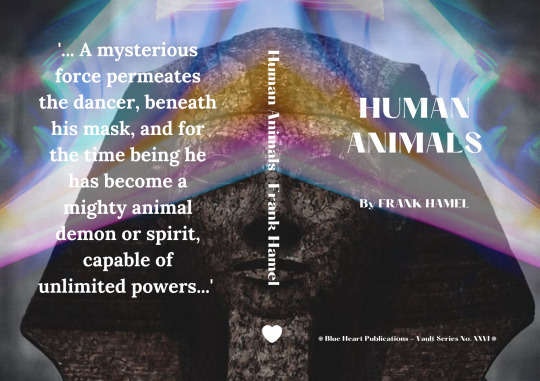
Frank Hamel's "Human Animals" is a thought-provoking exploration of the intricate interplay between our human nature and the animal instincts that reside within us. This fascinating journey into the realms of biology, psychology, and societal constructs unfolds with a narrative precision that both challenges and enlightens. The title itself serves as a prelude to a comprehensive examination of the dualities that define our existence—a title that hints at the untamed aspects of our being, waiting to be unraveled.
Published in [Year], "Human Animals" is a testament to Hamel's keen intellectual curiosity and his ability to distill complex concepts into a narrative accessible to a broad audience. The title alludes to the central theme—the recognition that beneath our veneer of civilization, there exists a primal essence shared with our fellow creatures in the animal kingdom.
Hamel's exploration begins with a scientific lens, dissecting the biological similarities between humans and other animals. The opening chapters lay the groundwork for understanding our shared ancestry, evolutionary traits, and the genetic links that bind us to the broader animal kingdom. The title "Human Animals" becomes a guide through this scientific inquiry, inviting readers to reconsider their perception of human uniqueness.
Beyond the biological, Hamel delves into the psychological dimensions of our shared humanity. He navigates the complexities of human behavior, emotions, and social structures, drawing connections between our actions and those observed in the animal world. The title encapsulates this psychological journey, suggesting that within our societal constructs, there exist primal instincts that shape our behaviors.
Hamel's writing is not merely an academic discourse; it is a bridge between the scientific and the philosophical. The narrative is enriched by anecdotes, case studies, and historical examples that add a human touch to the exploration. The title serves as a thematic compass, signaling to readers that they are embarking on a nuanced exploration of what it means to be human, entwined with our animalistic roots.
As the book progresses, Hamel ventures into the ethical considerations surrounding our treatment of animals and the environmental impact of human activities. The title becomes a poignant reminder of the responsibility we bear as stewards of the planet, urging readers to reflect on the consequences of our actions on the delicate balance of the natural world.
"Human Animals" is not just an examination of our shared biological heritage; it is a call to introspection and societal self-reflection. Hamel challenges preconceived notions, inviting readers to confront uncomfortable truths about the intersections of humanity and animality. The title, with its enigmatic allure, guides readers through a labyrinth of ethical contemplation.
In conclusion, "Human Animals" by Frank Hamel is a captivating exploration that transcends disciplinary boundaries. The title encapsulates the essence of the book—a multifaceted exploration of the intricate connections between humanity and the animal kingdom. Hamel's prose is engaging, his ideas are profound, and the title acts as an evocative portal into the depths of our shared nature. As readers journey through the pages, "Human Animals" leaves an indelible impression, challenging us to peel back the layers of societal conditioning and reevaluate our place within the vast tapestry of the natural world.
Frank Hamel's "Human Animals" is available in Amazon in paperback 15.99$ and hardcover 23.99$ editions.
Number of pages: 399
Language: English
Rating: 9/10
Link of the book!
Review By: King's Cat
#Frank Hamel#Human Animals#Biological similarities#Animal instincts#Dualities of existence#Evolutionary traits#Genetic links#Animal kingdom#Scientific exploration#Primal essence#Shared ancestry#Psychological dimensions#Human behavior#Social structures#Societal constructs#Human uniqueness#Philosophical inquiry#Anecdotes#Case studies#Historical examples#Ethical considerations#Environmental impact#Stewards of the planet#Consequences of actions#Delicate balance#Responsibility#Call to introspection#Societal self-reflection#Challenging preconceived notions#Uncomfortable truths
5 notes
·
View notes
Text
"They wanted comfort, and then they wanted luxury, and then they wanted excess, and every step of the way they still wanted to be safe, even as they made themselves more and more of a tempting target, and the only way they could stay safe was to have enough power to keep everyone off that wanted what they had." -Naomi Novak, A Deadly Education
#naomi novak#a deadly education#the scholomance#inequality#wealth#education#society#social structures
30 notes
·
View notes
Text
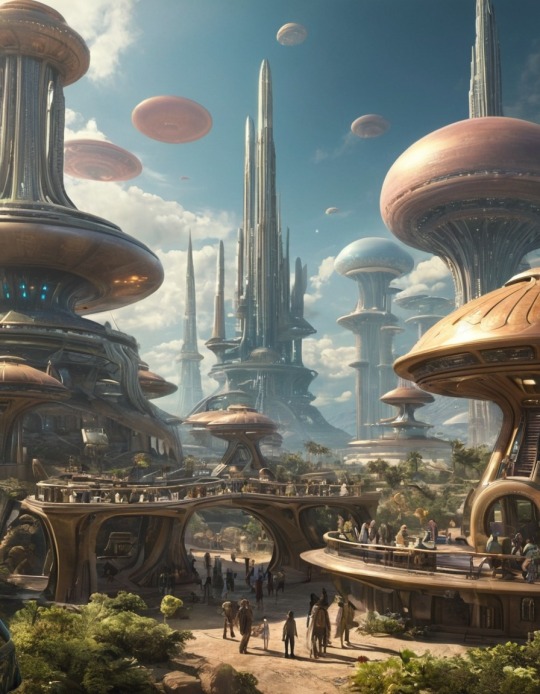
0 notes
Text
"Unraveling the Human Tapestry: Frank Hamel's 'Human Animals'—A Journey into the Complex Nature of Humanity"
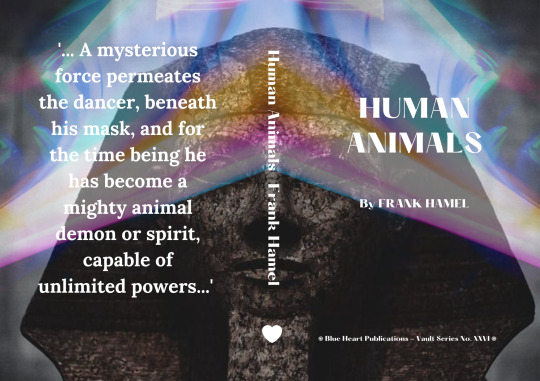
Frank Hamel's "Human Animals" is a thought-provoking exploration of the intricate interplay between our human nature and the animal instincts that reside within us. This fascinating journey into the realms of biology, psychology, and societal constructs unfolds with a narrative precision that both challenges and enlightens. The title itself serves as a prelude to a comprehensive examination of the dualities that define our existence—a title that hints at the untamed aspects of our being, waiting to be unraveled.
Published in [Year], "Human Animals" is a testament to Hamel's keen intellectual curiosity and his ability to distill complex concepts into a narrative accessible to a broad audience. The title alludes to the central theme—the recognition that beneath our veneer of civilization, there exists a primal essence shared with our fellow creatures in the animal kingdom.
Hamel's exploration begins with a scientific lens, dissecting the biological similarities between humans and other animals. The opening chapters lay the groundwork for understanding our shared ancestry, evolutionary traits, and the genetic links that bind us to the broader animal kingdom. The title "Human Animals" becomes a guide through this scientific inquiry, inviting readers to reconsider their perception of human uniqueness.
Beyond the biological, Hamel delves into the psychological dimensions of our shared humanity. He navigates the complexities of human behavior, emotions, and social structures, drawing connections between our actions and those observed in the animal world. The title encapsulates this psychological journey, suggesting that within our societal constructs, there exist primal instincts that shape our behaviors.
Hamel's writing is not merely an academic discourse; it is a bridge between the scientific and the philosophical. The narrative is enriched by anecdotes, case studies, and historical examples that add a human touch to the exploration. The title serves as a thematic compass, signaling to readers that they are embarking on a nuanced exploration of what it means to be human, entwined with our animalistic roots.
As the book progresses, Hamel ventures into the ethical considerations surrounding our treatment of animals and the environmental impact of human activities. The title becomes a poignant reminder of the responsibility we bear as stewards of the planet, urging readers to reflect on the consequences of our actions on the delicate balance of the natural world.
"Human Animals" is not just an examination of our shared biological heritage; it is a call to introspection and societal self-reflection. Hamel challenges preconceived notions, inviting readers to confront uncomfortable truths about the intersections of humanity and animality. The title, with its enigmatic allure, guides readers through a labyrinth of ethical contemplation.
In conclusion, "Human Animals" by Frank Hamel is a captivating exploration that transcends disciplinary boundaries. The title encapsulates the essence of the book—a multifaceted exploration of the intricate connections between humanity and the animal kingdom. Hamel's prose is engaging, his ideas are profound, and the title acts as an evocative portal into the depths of our shared nature. As readers journey through the pages, "Human Animals" leaves an indelible impression, challenging us to peel back the layers of societal conditioning and reevaluate our place within the vast tapestry of the natural world.
Frank Hamel's "Human Animals" is available in Amazon in paperback 15.99$ and hardcover 23.99$ editions.
Number of pages: 399
Language: English
Rating: 9/10
Link of the book!
Review By: King's Cat
#Frank Hamel#Human Animals#Biological similarities#Animal instincts#Dualities of existence#Evolutionary traits#Genetic links#Animal kingdom#Scientific exploration#Primal essence#Shared ancestry#Psychological dimensions#Human behavior#Social structures#Societal constructs#Human uniqueness#Philosophical inquiry#Anecdotes#Case studies#Historical examples#Ethical considerations#Environmental impact#Stewards of the planet#Consequences of actions#Delicate balance#Responsibility#Call to introspection#Societal self-reflection#Challenging preconceived notions#Uncomfortable truths
0 notes
Text
The Harmony Within
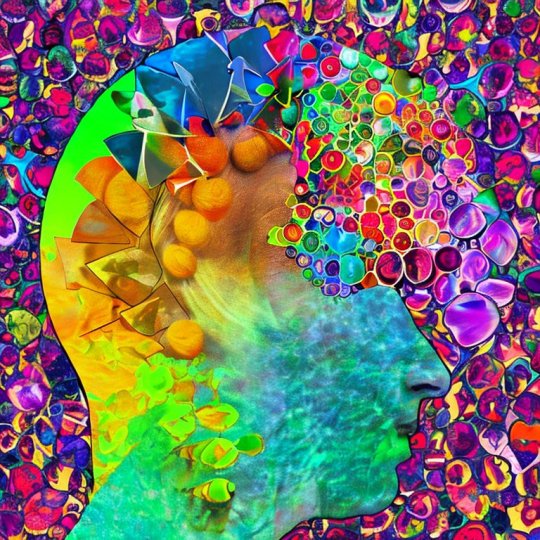
View On WordPress
#balance#biology#Collective Consciousness#Consciousness#cultural values#external influences#Four Quadrants#genetic predisposition#holistic development#human behavior#human evolution#human existence#human nature#inner self#Integral Theory#Ken Wilber#Nature vs. Nurture#personal experiences#Self-Discovery#social structures#societal norms
0 notes
Text
this year my challenge for everyone is to unlearn the association between love and morality. love is not something that is inherently morally good, and the absence of love is not something that is inherently bad. sex without love isn't morally bankrupt, it's just an action. people without love aren't less kind or less good, they're just people. when we can get past this false (and often unnoticed) dichotomy of good love/evil lovelessness then i think we are going to be able to take leaps and bounds in sex positivity, aro advocacy, certain discussions of mental health...
#and also. not the direct focus. but love doesn't make things good. you can be in love and do terrible terrible things.#people do bad things in the name of love and in despite of love all the time.#but!! imagine a world where people could exist as people and not be demonized.#sex positivity means being cool about All sex. reexamine your internal systems of moral judgement.#this goes for sex workers. for aroallo people. especially aroallo men. for aro people in general who might enjoy sex.#and frankly i think it can easily bleed into discussions about mental health disorders around 'not feeling' certain things#especially demonizing ppl who don't feel as much empathy. i think there's definitely a correlation between that and the emphasis on love.#our support needs to go out to Everybody and i think these things are all structured together in one way or another!!#it might not be immediately obvious but when i tell you it all leads back to amatonormativity..... little bit wild.... large bit wild....#anyway. horror movie psychopath 'oh he can't feel emotions or love' damn alright. well. let's take a closer look at that.#silly that there's an association between lack of love and Murdering. feel like that might affect some stuff.#love is just an emotion/a feeling it doesn't mean anything about you one way or another#same with empathy. you can feel it all you want but it doesn't inherently change the actions you choose to take#anyway. thesis statement. there is a socially constructed link between love and morality. unlearn that.#kiss kiss (<— lovelessly)#aromantic#aromanticism#arospec#talking#aroace#aspec#sex positivity
1K notes
·
View notes
Text
thinking about how Oda chosing Luffy, a pirate, to be the protagonist of One Piece may be one of the most brilliant story moves by any shonen mangaka ever. by virtue of its main character being an in-world criminal, OP naturally lends itself to becoming a story about the exposure of a society festering with corruption for what it really is, and the dismantling of a dystopia and its propagandist facade. you simply do not get a story like that with a shonen protagonist who conforms to or tolerates the shitty system they're born into
#one piece#luffy#monkey d luffy#ive been watching non-OP shonen lately and its been hitting me that for all of them#ALL OF THEM#their protagonists' hero journey is about climbing up the ranks of an established social structure#where that established structure in question is considered the 'good guys' in universe#and the protagonist more or less does not push against the structure no matter the consequences of that structure's actions#like yeah they'll question a moral quandary here or there but for the most part they're like#'this is how things work *shrug*'#im convinced that if OP is just another shonen its main character would've been Koby#anyway this is why OP is best shonen thank you for coming to my tedtalk
2K notes
·
View notes
Text
I don't know who needs to hear this, but if you have disability accommodations at uni/school/work, you don't have to just use them for the disability you originally applied for them with. if you get no-questions-asked extensions on assignments or extra time on exams or whatever, you are allowed to lie about why you need those. take whatever these institutions will give you. being disabled can be shit for more reasons than just your face-value symptoms, and you deserve whatever you can get
this is ESPECIALLY true for those of us with stigmatised disorders that we haven't disclosed. when I struggle with uni work due to psychosis or addiction, I have no choice but to blame my autism or my chronic pain. and you know what? that is 100x better than trusting an ableist institution with sensitive information about yourself. don't feel guilty for lying about this stuff
#disability#I truly believe that as disabled people we should be allowed to lie steal and cheat our way through ableist social structures#and not feel guilty for it
234 notes
·
View notes
Text
One time I asked my mom (in her 70s) whether she, personally, knew any people in so-called "traditional marriages." I defined a "traditional marriage" as follows:
A man and a woman, married to each other
They are both each other's first and only spouse, neither has been married before
Neither of them has any children with any other partner
Any children they have were born after the couple was married.
After thinking about it, my mom was able to come up with a few examples of such couples.
But only a few.
And she had to think about it.
Yet we still live in a society where this type of family is considered "the norm" and the much more common types (blended families, single parents, divorced people) are considered "exceptions."
And this is not the only thing like this! There are many experiences/lifestyles/family types that are treated as The Default or The Norm that, in fact, may not apply to a majority at all!
Even in discussions like "We should remember that not everyone has [normative experience]," it's still framed as though the normative experience is, of course, still the statistical norm. It might not be at all! Or maybe it is the statistical norm worldwide, or nationwide, but not in your particular community, or your social circle.
Sometimes it's necessary to look at global or national statistics to correct your bias of extrapolating from your social circle.
Social bubbles are a real problem.
But. But. Other times. It's useful to just look at your social circle and ask yourself "Do these population-wide statistics really apply here? Should I be looking at them to determine what's 'normal' instead of just looking around me?"
So here are some things that are culturally assumed in the U.S. to be "the norm", that you might want to ask yourself: How many people do I know personally that this is actually true of? (Other countries have their own maybe-not-that-normal norms that I'm not as familiar with, but feel free to weigh in on).
How many people do you know personally who:
Have a "traditional marriage" as described above?
Have a work schedule of Monday through Friday, ending at 5:00 p.m.?
i.e. for whom Saturdays, Sundays, and evenings after 5:00 are "not at work" time?
Attended residential college from ages 18 to 22, and graduated with a bachelor's degree by age 23?
Had most or all of their college tuition and living expenses paid for by their parents?
Have, as an adult, the same surname as both of their parents, who were and still are, married to each other? Which was their father's surname which their mother took at marriage?
i.e. whose parents could accurately be referred to as "Mr. and Mrs. [that persons' same surname]"?
Don't take any regular daily medicine?
Depending on your social circle, you might know very few people in these categories! But you probably still hear people say unquestioned, taken-for-granted things like "We should have the meeting at 6:00, so people can come after work," or "Of course parents of college students should have a say, since they're paying for it."
In many demographics, these things aren't just "not always true"; they're hardly if ever true. I wrote here about the false assumption that college students are uniformly single, childless young adults. Are you scheduling your events on the assumption that evenings and weekends are free time? For that matter, how many child care providers serve families during the hours that most parents actually work? Are we ready to admit that these things aren't the norm yet?
#normative social assumptions#family structure#family structure shaming#shift work#addressing parents as “mr. & mrs. [child's last name]” when you have no idea whether that's accurate
233 notes
·
View notes
Text
next months print club piece is gonna be a laikas comet piece! i worked a bit on it during stream last night but im really excited. im pretty happy with the composition and im just working on details/anatomy sketching rn.
#print club has allowed me to really slow down and take my time on individual pieces rather than cranking stuff out for like#comms/social media#its really awesome. i kind of hit a point where i was happy with my line quality/colors/concepts#but i wanted more practice with like. Structural drawing. rendering. detail work#which isnt something that you can get better at with repetition alone. you also need time to sit and flesh it out#so thats osrt of what print clubs been letting me do#tackle more complicated pieces otherwise i wouldnt have been able to justify#scratchpost
156 notes
·
View notes
Text
Laios Touden and autism; admiring the non-human
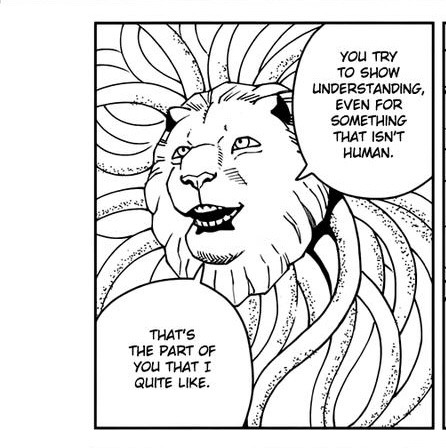
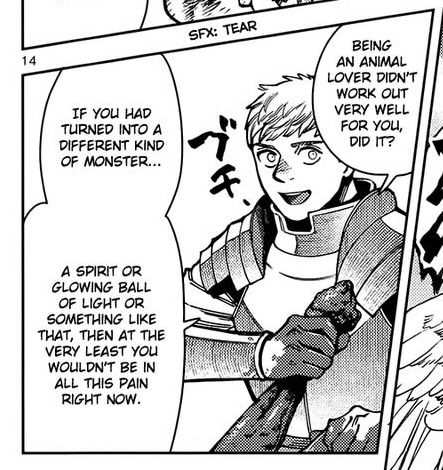
Do you think people exaggerate when they scream about Laios being autistic? Do you feel like it’s weird that so many people including autistics are so set on Laios, the problematic (but incredible and kind) king TM, being the most autistic that has ever autisticed? Why do we cheer on autistic people wanting to be monsters?? Isn’t that weird?
Well, of course it depends on the way it’s done, it can be done quite offensively, but long story short Kui blew it out of the park. The thing is, autistic people really do like monsters and animals and robots. Nonhuman does not mean subhuman, it just means Other. Feeling a connection with them has been shown to be an extremely common autistic experience for that very reason.
Because some people don’t understand why we autistic Tumblr Laios stans cheer “autism! Autism!” whenever he talks about monsters and feeling alienated to humans so! Here’s a post about how yes even research papers are analyzing the special connection we form with animals. I’m not even joking but Laios Touden & the mass cries of relatability with autistic people he gets and all the love for him could be used as study material and evidence for future papers because the link is that strong.
Oh also I think it’s notable that being autistic and undiagnosed vs diagnosed makes a huge difference. In my experience as someone who was undiagnosed up until 18, it’s even more alienating to not know that there’s a reason why you’re different, being gaslit that you’re ‘normal’ and you just need to try harder and get with the program, etc. Personally when getting diagnosed I went through the 5 stages of grief because the thought of having been fundamentally different all your life (a difference which you will never be able to change) and mistreated for it when you weren’t “wrong” all along makes you unload all the anger and sadness and loneliness and sheer trauma you’ve built up over time. Like it’s world shattering.
So! Back to seeing dogs as family.
Also I implore you to value experiential evidence when it comes to autism and other neurodivergences because brains are complicated and neurotypicals not being able to understand us well even with scientific research is like, a whole thing even though we’re right there speaking about how we feel and being right every time because the topic is literally us and how we experience the world.
Disclaimer for this whole post that, of course, no group is a monolith and everyone has different experiences or can diverge from the norm of the group, and that doesn’t diminish the validity of either side! Like, I know autistic people who have trauma with dogs and hate them. But, trends do happen, and in this case... Autism is very “My experiences with humans make me feel dehumanized in a bad and lonely way so instead I’ll dehumanize myself in a good and inspiring way”.
“I was treated like a failed human my entire life and you’re surprised that my response was to become a dog.”
-Patricia Taxxon
It’s literally well recorded that autistic people relate to animals more than humans globally. With this post, besides spreading autistic Laios truthism and explaining why the portrayal hits so deep for so many, I want to show in what way this is a very specific experience and not looking at his character through an autistic lense really misses a lot of why he’s everything that he is. (Tacking allegedly onto here for legal reasons, different interpretations are valid etc etc /gen). This honestly isn’t super long though.
To define an important term, anthropomorphism in the studies and in this post means to attribute human traits to the nonhuman, which not only includes anthro furry designs but also animals irl, inanimate objects, and animated media as opposed to live action, to humanize them and empathize with them.

Paper: https://www.liebertpub.com/doi/10.1089/aut.2019.0027
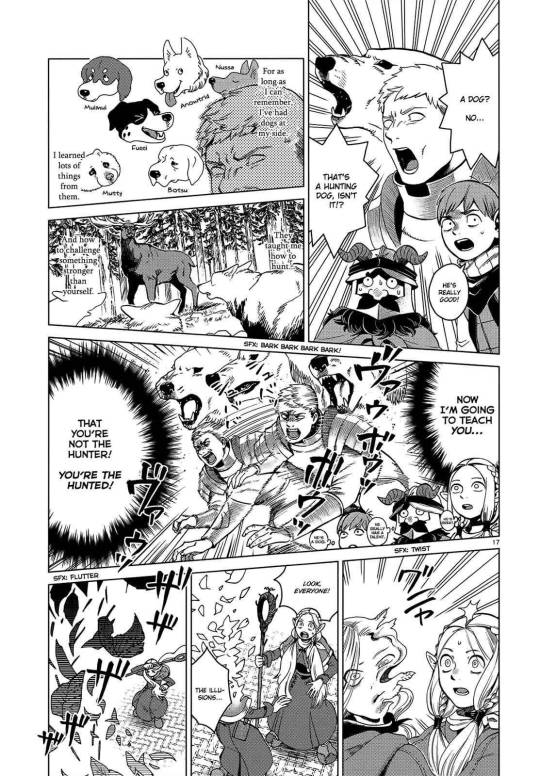
“Dogs taught me how to hunt and socialize and work in groups”, Laios having internalized body language... So real so real. I, too, make a great dog impression. And I want to emphase the part that it helps greatly develop a sense of emotions and relationships! For Laios, he didn’t get along with kids his age, it was him, Falin and the dogs against the world. Since it’s a group of dogs too, it taught him group dynamics and social hierarchies (like with Falin being considered as being below the dogs in authority according to the dogs rip), and the importance of group coordination when hunting.
For me, I cannot like, concisely explain just how much animals were important to me developmentally. I also grew up with dogs, but like I vividly remember encounters with like hamsters as well just radically shaping my understanding of boundaries, the importance of giving something space and the way you interact with them and respect their side of it. Unlike humans they don’t really mask how they feel, it’s direct cause-effect reaction and data gathering. There are no words involved, so the focus on having a perfect phrasing and tone is gone, leaving just pure interactions.
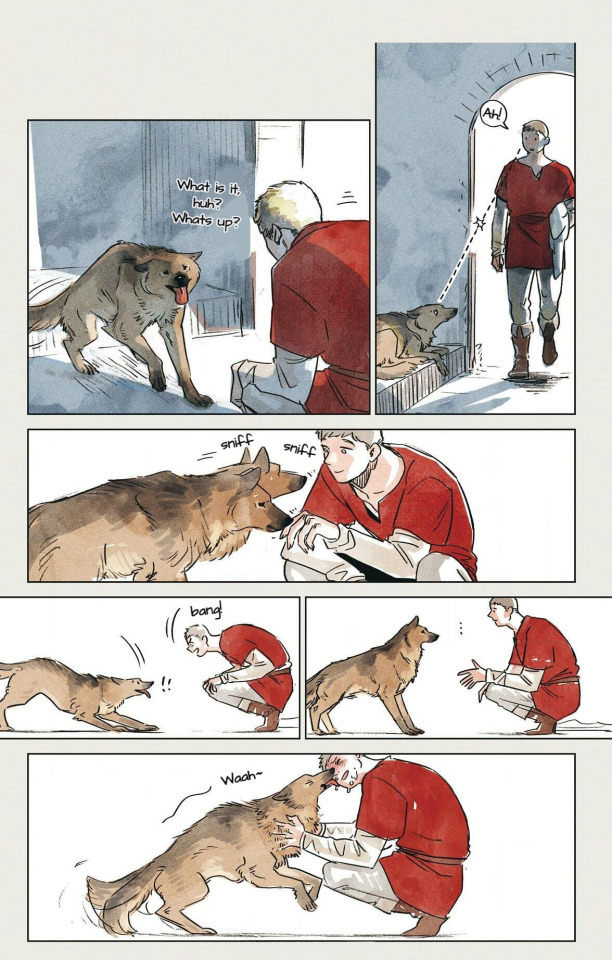
There’s also no reason to mask how you feel either, and you don’t have to feel silly over wanting to form a connection and it showing, what, is the dog gonna laugh at you because you obviously want to make friends with it? Toshiro or Kabru might, but dogs and cats will just tell you to fuck off and leave it there worst case scenario.
I often say that I think one reason Marcille is special to Laios and he feels comfortable around her is because she emotes INTENSELY, she gestures, she puts her whole body into it, her facial expressions are pretty exaggerated and her ears even emote too- like with a dog’s ears!
I think there’s def also things to be said about how he gravitated towards Izutsumi at first, all excited, was eager to sleep in the same bed as her, but in the Izutsumi sleep rating chart we see they really just casual and chill so it’s not a Laios talking to Shuro deep into the night situation just a “I like sleeping besides animals” situation and that is enough to hype him up. I love how he pet her in the extra about why Chil let her sleep with him too. He’s just so transparently eager to befriend her, even if in the end they weren’t all that compatible and he accepted that.

There are honestly so many examples I could give for this. Like Grandin the famous cow lady.

More about autism & empathy:
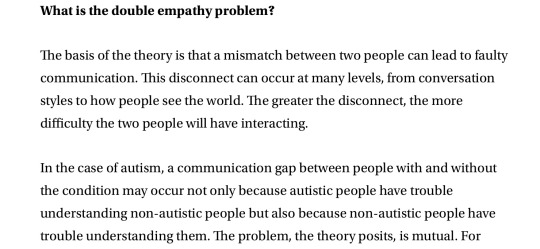
https://www.spectrumnews.org/news/double-empathy-explained/ (Also mentions a study in which groups of autistic, allistic then a mixed group played a game of telephone and both singular groups had similar levels of information retention, but the mixed group was significantly worse. As an autistic person yeah duh, obviously autistic people are different from one another and can have plenty of interpersonal issues, but communicating with other neurodivergent people feels pretty intuitive and straightforward and comfortable. One of the reasons why neurodivergent people tend to naturally gravitate towards each other I suppose.)


^ Paper: https://www.ncbi.nlm.nih.gov/pmc/articles/PMC5932358/
For good, extensive summary of why we relate to animals so much you can go to the “anthromorphizing and asd” section of the paper. This paper extends to our widespread liking of cartoons and robots as well.
Ok so this is a whole thing I won’t get into here but this is a big reason why a lot of autistic people are agender leaning as well. Genders and queerness in general is a lot about social constructs, and being queer is being marginal to these, not fitting into boxes or challenging those social norms and conventions. Queerplatonic relationships are a great example of this, where the framework of the relationship is platonic but the intangible nature of what it is exactly is the point, not familial not anything but everything at once too, just adoration, I like to say having pets is a bit like it as well, bc obvi it’s not romantic and often not fully familial, very platonic but also sooo much cuddling and adoration and kissing and whatnot that you wouldn’t typically do with a friend or family member. I’ll talk about qpr and labels another day though.
I got carried away but queerness in Dunmeshi is something I 100% want to make a big post on one day. Experiencing the world with different guidelines and not registering things to have the same boxes, sigh. Personally I also relate to Laios on a gender level, “cis by default because I don’t care all that much but if I were to dig deeper I’m probably otherkin and I want to be socially associated with traits of monsters and animalistic rather than man/woman” sighh hard to be a cryptid in this day and age. I wish we had a term like furry but for monsters, I want to be in the fantasy or folk tale genre ty, like changelings. Goshh changelings... You know, the irl myth where people said their neurodivergent kids were fairies’ children instead of human. Diminished physical sense of self means I see myself as some unknowable black void aesthetic wise, but like in a way that simultaneously makes me feel seen. Like becoming a monster, losing your sense of self but also somehow just being simplified and seen for what you are, it’s weird to try and explain.
This post is more about relating to the nonhuman than about seeing yourself as such, but like connect the dots right, that IS an important point of Laios’ character. It’s because our brains literally work different than allistics which makes us feel as other, but also because of social ostracization and functioning in a different way than society at large, living in the margin of society, being weird and non-conforming.
Meanwhile, animals and social norms... Like ok, showing your neck and rolling on the ground to show that you’re friendly and harmless and play biting might not be proper. But have you considered that it’s also fun and feels very intuitive. Play with a dog in the dog’s way I promise it is so nice and freeing. Play tug of war and growl back when they growl. Hiss at your cat to tell them they do something wrong, engage with them on their level.
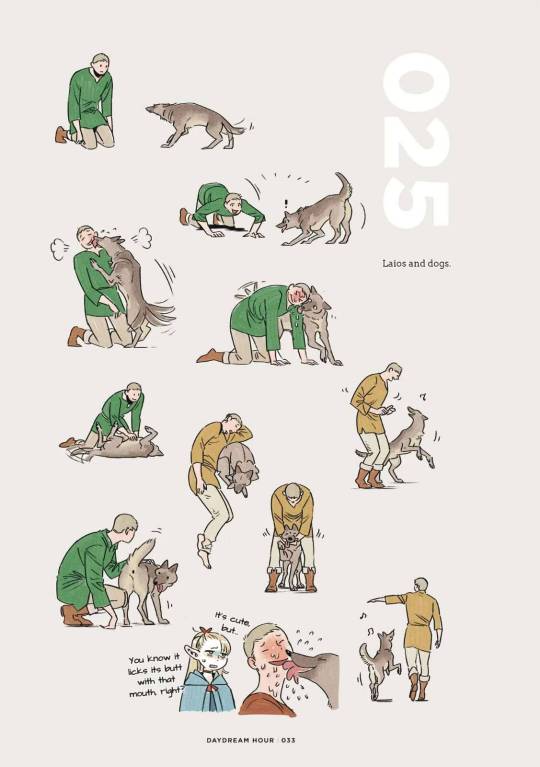
Autism made social life hard, but it made animals easy.
Do you have anyyy idea how good it feels to mask all day every day and feel constantly misunderstood or like you’re doing a performance but then you can just, drop all of that in the company of animals and they understand you. They understand you. You form an understanding and rapport so easily.
And this whole thing with Laios is so explicit too, with the Winged Lion saying “You’re sick and tired of the human world”. Notice the choice of words. Sick and tired of the human world. Exhausted from the constraints, sick of the mind games.
It really isn’t as much about loving monsters as it is about loving the nonhuman. Relating to them because you feel that you can actually understand how they work and think, and feeling like they could understand you back as well. Animals are safe.
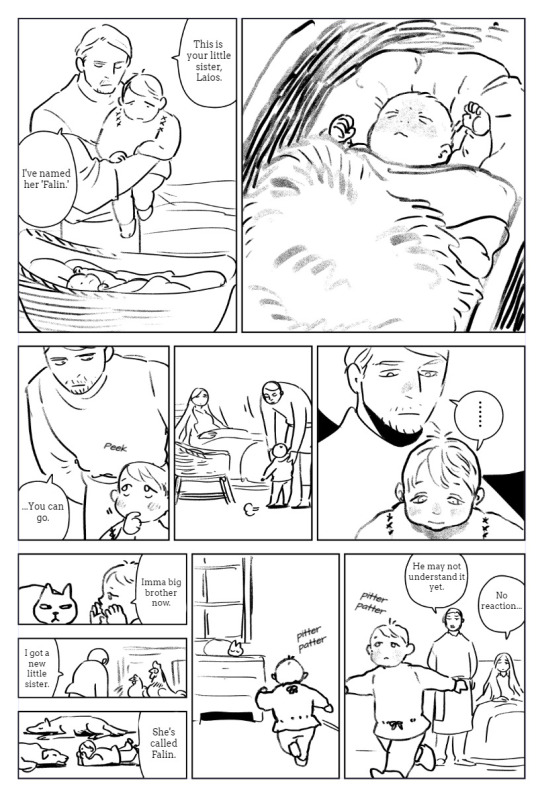
Like I could go on about how Laios admiring even just demi-humans like orcs is because they’re socially seen as non-humans more than any true physical thing, that they’re not bound by human society and its rules and live with their own lifestyle. But it would deal myself 1000 points of psychic damage and I am not ready to cry today. It’s idealization 100%, and like, Laios DOES want to be treated as human, to be valued, but it feels like an unreachable thing meanwhile becoming a monster is instant gratification and freedom and a sense that now no one will be able to hurt you in a way that reaches you, never again shall you be defenseless, and then if people dehumanize you then that only strengthens your sense of identity as a monster and UGHH ugh ugh.
And like. This post is a mess at this point but if you want to kinda delve into the more “why” then I recommend this Patricia Taxxon video essay. It starts out on a very different topic, but it’s all about autism and finding comfort in the inhuman. Long story short is othering made us like this also animals are just simpler to intuitively get along with.
So when I post this
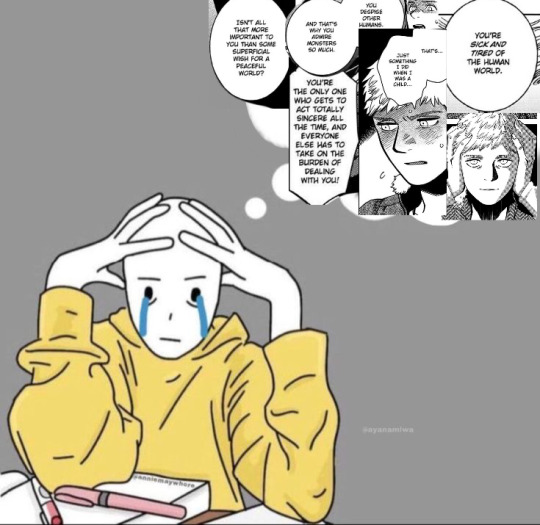
I mean it. I really mean it when I say he’s me. I have never felt so seen. So many conflicting emotions all wrapped so concisely yet so intangibly woven into the whole storyline so subtly.
Not being depicted as a monster of an human being for feeling/having felt that way?? The manga understands you. The world can understand you. Other humans can understand you. You can bond with them. You can.
And I think that’s a big part of Dungeon Meshi too- Laios opening up to others about how he really is and his interests, and all the bumps on the way but how it was the only way to truly get to know each other and bond. With the climax being Laios confronting head on his complex with monsters and humans, and his monster-loving side and animalistic side being exactly what saves the whole world, what saves humanity.
Because Laios does value his friends, does think humanity has beautiful sides to it, he wants to help it thrive and eat and become more accepting, carving out a kingdom for misfits and demi-humans. At the end of it, transforming into a monster and being free is a daydream fantasy, and the reality of it is that Laios does belong in the world as he is, and does receive and give out love.
If you enjoyed this you’ll probably like some of my other Laios analysis!
Here’s an analysis of his succubus and what it says about his relationships with other humans.
And here’s an analysis about his relationship with Shuro from his perspective.
#dungeon meshi#delicious in dungeon#laios touden#character analysis#i guess#dungeon meshi manga spoilers#spoilers#autistic laios touden#asd#autism representation#meta#draft so old it uses the old Tumblr post editor#it would be much better if i could put them side to side rip#i also wanna do an analysis trying to pin down his level of social awareness#i love that the monster story epic saga about misfits and your place in the world on an ecosystem level is just sooo autistic so perfect#this post has a weird structure but hopefully it can showcase some things and make ppl understand and others relate! I know we're out there#hiii therians how we feeling today. Brain chemistry is weird but ours is just wired different not broken#feeling self-conscious bc even with studies this is the equivalent of going 'trust me bro I get it' which usually doesn't go well with us#Humanity is beautiful <3333 Humans are social animals broski love yourself!!!
229 notes
·
View notes
Text
we get a lot of really great stuff in system collapse about murderbot's relationships with ART and ratthi, which makes sense, because it spends almost the entire book with them. but i also love how even though mensah isn't there for most of the story, other people keep reminding mb of her:
chapter 2, page 25: “From ART’s personnel file, she [Karime] was older than Mensah and she didn’t look like an intrepid space explorer, either, even in the protective environmental suit.”
2, 27: “It took Karime three seconds to process the abrupt statement. (She was almost as good at not looking annoyed as Mensah was.) She kept her expression neutral and patient.”
2, 28: “In the underground colony room, Karime lifted her brows. ‘Another occupied site?’ I thought she was being careful not to show too much reaction. It was the way Mensah would have played it.”
4, 70: “Iris looked at me and I saw her hesitate, because her hesitation looked a lot like Dr. Mensah’s hesitation. And I realized I really didn’t want to go down there.”
5, 104: "Iris has that same thing as Dr. Mensah, the thing where she’s able to look and sound calm under circumstances where shit is possibly about to go down.”
it's spent so much time with her and it knows her so well and respects her so much that she's the model against which it compares all other humans. it thinks about her when they're not together. it's protective of her. it has such total faith in her competence. it (non-romantically) loves her and doesn't want to not see her again. idk man, it just gets to me! and they were teammates (oh my god they were teammates!!)
bonus:
I said, aloud, "You have to be kidding me." (ch. 2, p. 28)
seven pages later, in reaction to the same thing:
Mensah had had time to review the feed video. She muttered, "Oh, you have to be kidding me."
Yeah.
twinsies 🥰
#something about their relationship is just sooo potent because of the structural power that mensah has over mb#and how mb has always been trying to navigate how much it cares about her and respects her with how afraid it is#of being a thing that she owns#because even if she doesn't exercise that power over it the fact remains that the context in which they live makes that possible#like! socially constructed ideas of personhood creating inherent violence in the human-construct relation!#even if she means well. even if it's necessary for mb to have a legal owner so that some corporate doesn't claim it as property.#it's not that mensah is an unsafe person it's that the power imbalance is intrinsically baked in because of#the broader social context of constructs as nonpersons. as property and equipment#all of that is true! AND it respects her and loves her. AND they're teammates! they are both trying so hard#to create sth just and beautiful out of sth really messed up. and trusting each other to collaborate in that way!#it was SO necessary for mb to leave at the end of ASR and SO necessary for it to get proof at the end of ES#that she would not try to stop it from leaving. that it was free. that it was autonomous#idk idk i'm rambling i just. i care them#the murderbot diaries#mb teammates#mb sc#system collapse spoilers#system collapse#my posts#murderbot
349 notes
·
View notes
Text
I really do think it's interesting that the way DE discusses ableism gets ignored by a lot of the fanbase. Because Harry is undeniably disabled and that's a core conflict of the game. He's living in an impossible situation that so many disabled people get caught in; he's physically disabled, even more so by the end of the game after being shot, but even at the beginning of the game he struggles with nerve damage, post-polio syndrome, partial paralysis in his jaw, withdrawals, and that's not even starting on the mental illness. He is sick and cannot ever properly heal under these circumstances because he cannot stop moving forward or he will start to sink. He's living in poverty. He has no safety net. No way out of the RCM. That night in Martinaise before the beginning of the game, he tries to quit- throw everything away. He tries to end his own life and drive his car into the sea because he cannot fathom a future where he's able to get out of this alive when he's so intrinsically bound to this abusive institution that he can't escape from.
And then comes Jean, deliberately forbidding anyone from jogging Harry's memory out of spite and anger, refusing to allow anyone else to help, calling him a fucking idiot and a psychopath, asking if he can go to the toilet on his own, telling him that he doesn't deserve his disability pension because it should go to cops who gave a shit instead (nevermind that Harry has been working at burnout pace for years, he's an addict so his contributions are essentially worthless, right?). He has a conversation with Judit, right in front of Harry, on whether or not he has learning disabilities.
This guy is a very interesting character! And I'm not denying that he's likely dealt with consequences at work from Harry's illness. But he also fulfils the narrative role of being a mouthpiece for the suspicion and even outright aggression that addicts face even while trying to recover. He fulfils the role of a representative of the RCM, with the ability to approve or deny Harry’s return and in turn essentially sentence him to a slow death in the seaside village. He is not there to help; he is there to judge and observe, and then blame Harry when things go bad even though his inaction is at least in part responsible for the deaths during the tribunal. And this is all very deliberate! The RCM, and by extension the Coalition, as an organisation is failing both its officers and its citizens- Jean, by extension, is one of the officers being failed! They are underfunded, overstretched, overworked, and shouldn't even exist in the first place. The expectation on partnered officers to provide emotional support to each other is ridiculous. But instead of directing his anger upwards towards the Coalition airships or superiors at the RCM, he directs it outwards, towards 'the liberals' or towards Harry, who as a disabled addict is a pretty convenient punching bag.
His vitriol towards Harry is not supposed to be sympathetic! At least the way I read it, you're not meant to look at him and think 'oh wow Harry's struggle has been so hard for him.' You're meant to question his language, to think more deeply about how society treats addicts, how punitive measures are never going to help someone get sober, about the importance of safety nets.
#disco elysium#idk man its the social murder game people keep saying this#this is not to say that youre never meant to sympathise with jean or question Harry's actions either#like clearly pre-martinaise harry did some pretty terrible things that's undeniable#but can we do some more blaming the occupying government and structural issues for Jean's issues#and less villanising one of the best portrayals of addiction that ive seen in a long time?#please?#harry du bois#personal#suicide tw#DE rambling
673 notes
·
View notes
Text
I’d love to see a book that goes in depth on the idea of a creature that eats humans and when they are told by a human to stop they say “how is me eating human any different than you eating cow,” and the human counters with “but cows don’t have sentience the same way we do,” but the the creature simply laughs and goes
“Awwww little human thinks he has a soul, thinks he can comprehend everything we can, how cute.”
#writing inspiration#writing prompt#veganism#animal rights#cosmic horror#Im tired but might write this later#In the meantime feel free to take a stab at it#Honestly I’ve just been reading a lot of JTTW and was thinking about the way the White Horse Dragon is treated like an animal#Even though he can speak and think and lives in a complex social structure#It’s still seen as not wrong when he eats a horse cause that’s just the circle of life#Can’t help but wonder if the same would be said if he had eaten a human#JTTW
304 notes
·
View notes
Text
529 notes
·
View notes